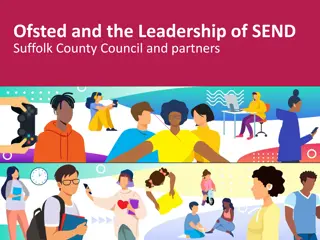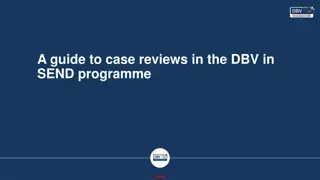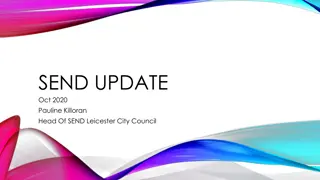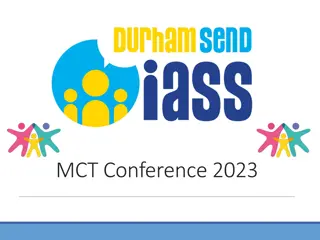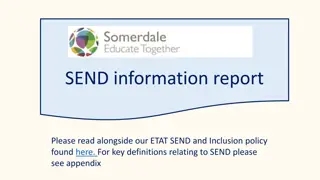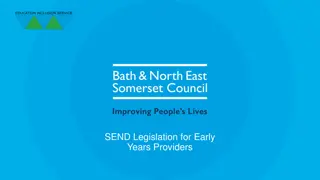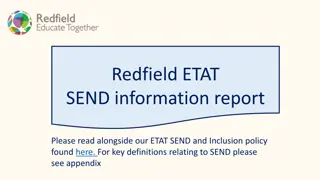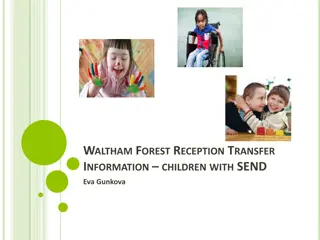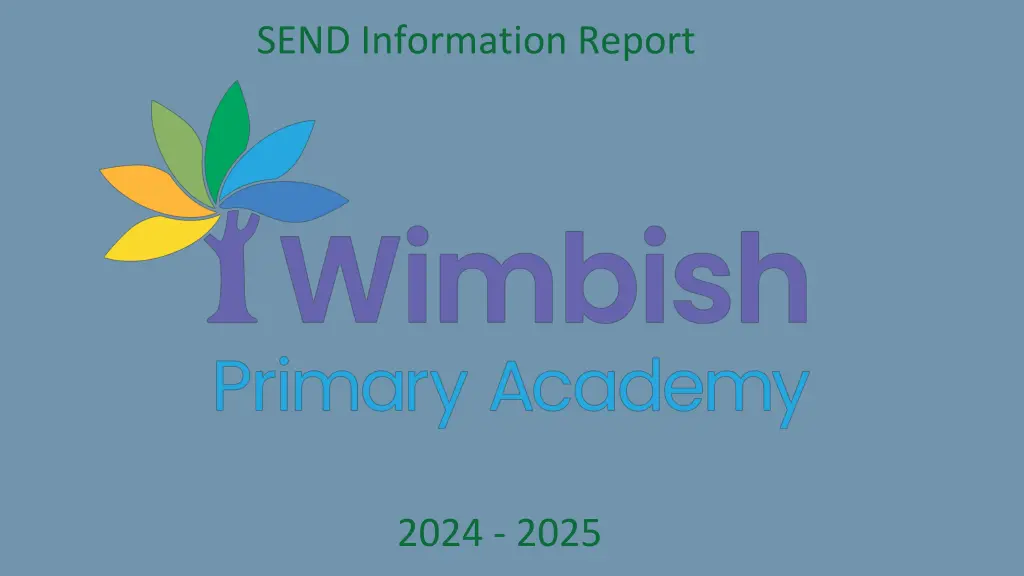
Supporting Children with Special Educational Needs and Disabilities
Learn how children with special educational needs or disabilities are supported at Wimbish, including academic strategies, interventions, emotional and mental health support, and involvement of external agencies. Get insights on identifying needs, accessing support, and fostering overall well-being.
Download Presentation

Please find below an Image/Link to download the presentation.
The content on the website is provided AS IS for your information and personal use only. It may not be sold, licensed, or shared on other websites without obtaining consent from the author. If you encounter any issues during the download, it is possible that the publisher has removed the file from their server.
You are allowed to download the files provided on this website for personal or commercial use, subject to the condition that they are used lawfully. All files are the property of their respective owners.
The content on the website is provided AS IS for your information and personal use only. It may not be sold, licensed, or shared on other websites without obtaining consent from the author.
E N D
Presentation Transcript
SEND Information Report 2024 - 2025
What should I do if I think my child has a special educational need or disability? At Wimbish, we follow a graduated approach in responding to the needs of our pupils. There is a universal entitlement for all children to access high quality teaching. Many children s needs may be met through this Ordinarily Available Provision . In instances where this support does not meet specific needs, children may require additional levels of support. If you have a concern about your child, please contact their class teacher in the first instance.
How will my child be academically supported in school? Which strategies could be used to help them? Examples of in-class support used: Interventions: High quality teaching Dyslexia friendly teaching approach Evidence-based intervention programmes are utilised in school to support pupil s learning. Interventions are delivered by trained staff. All SEN provision is monitored and overseen by our Special Educational Needs Coordinator (SENCo). Progress within interventions will be tracked through baseline and post-intervention data. Here is a selection of some of the interventions we run: Progress and attainment is monitored through termly pupil progress meetings. We will meet with you if we identify that your child is not making expected progress. Visual supports (e.g. timetables, checklists, task breakdowns) Pre and post teaching of strategies and vocabulary Access to technology (e.g. iPad, voice recorder) Additional adult input/support in class (through group work or 1:1) 1:1 Reading Needs are identified through our raising a concern forms. Precision Teaching (Focus 5 Spellings) Scaffolded/modelled/differentiated tasks (access to an individualised curriculum in instances of severe SEND) Sensory circuits Additional support will be reviewed and updated termly by class teachers, who will detail this in a class provision map. These are kept in the classroom so that all staff are able to know how to support individual children. Speech and language strategies (e.g. Colourful Semantics, Shape Coding) Time to Talk 1:1 emotional mentoring Accessibility resources (e.g. writing slopes, pencil grips, wobble cushions Physical resources (manipulatives)
Children may be supported through: External agencies: How will my child s emotional/mental health and overall wellbeing be supported in school? Individual/group Social Skills Programmes Referral to the school nursing service/ Spangles family hub Self-esteem building/resilience interventions Referral to the Emotional Wellbeing Service Social Stories - using a purpose written story to explain and explore a social situation and different people s responses to it to develop understanding Children s mental health and wellbeing is of the utmost importance to us at Wimbish. Our SENCO is a accredited Senior Mental Health Lead. Other members of staff have also completed training around children's mental health. It is important to work with parents as partners, so if you have any concerns about your child s emotional health and wellbeing we would always encourage you to discuss these with your child s class teacher or the SENCo. Referral to YCT: COUNSELLING FOR CHILDREN AND YOUNG PEOPLE AGED 5-25 A designated person available for 1:1 conversations Referral to Child and Adolescent Mental Health service (CAMHS) should a child meet their thresholds. Strategies to reduce anxiety Consistent use of the school behaviour policy and positive reward system Home/school link books, behaviour plans Regular meetings with parents
How will you support my childs transition into/within/from the school? How will I know how my child is doing? How will I be involved? How can you help me to support my child? How will my child be included in activities outside the classroom? How accessible is the school? We believe that good communication is essential between home and school so that we can work together effectively. We may communicate with you: in face to face meetings; via telephone or email; through home/school diaries and letters. We liaise with a wide range of other professionals and will help with the explanation of professional reports to parents where it is helpful. We have built strong links with feeder schools and nurseries. We work to ensure smooth transition. This could be through visits to a child s new setting/class, meeting new teachers and individualised transition activities. We work closely with JFAN and SWCHS to facilitate transition to secondary school. Our school is an inclusive school and we ensure that every lesson is accessible to ever child wherever it takes place. Our school building is on one level. Individual access arrangements (where appropriate) are discussed prior to the child starting school and reviewed accordingly. In the event of any concerns about your child or our school s provision for children, parents should (in the first instance) contact their child s class teacher to discuss further. Any concerns that have not been addressed by this should be taken to the school s SENCo or Headtecher. The school s Governing Body lead for SEND (Mrs Alison Weir) is the final point of contact for these concerns and can be contacted via the school office. Where can I find further information?
Whos who? SENCo - Mrs Lizzie Beecroft-Sullivan Responsible for advising class teachers about the provision they make for pupils with SEND, overseeing the whole-school s SEND provision, co- ordinating training relating to SEND, liaising with and referring pupils to external services. lbeecroft@anglianlearning.org Speech and Language Therapy Service - SALT. Your child may be referred to this service if they meet the threshold level required for their support. Early identification is often key in EYFS. Occupational Therapy/Physiotherapy (if the child meets the threshold level required for their support) SEND Governor - Mrs Alison Weir Hearing/PNI Specialist Teaching Team (will be involved by your child s medical team if appropriate) Headteacher - Mrs Nichola Pickford npickford@anglianlearning.org SENDIASS (SEND Information Advice and Support - formerly Parent Partnership) Confidential phone line during term time 01245 204338 send.iass@essex.gov.uk https://www.essexsendiass.co.uk/ Special Educational Needs and Disabilities Service (SEND Service) Essex s Special Educational Needs and Disability (SEND) Service (0-25 years) provide a range of professional services and support for children, young people and families in a wide range of settings, including home, educational and community settings. The Service offers targeted support and training to schools and settings in all aspects of Special Educational Needs and Disability. We use the expertise of an integrated multi- professional Service to ensure that Essex meets its statutory duties and responsibilities for children and young people with SEND. See - the Local Offer https://send.essex.gov.uk/


